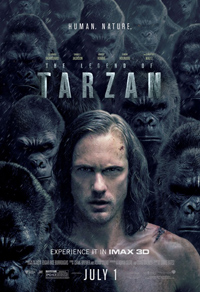Reviews
The Legend of Tarzan | Review
Monkey See, Monkey Do: Seditious Subtexts of the White Savior in Latest Tarzan Adaptation
 Certain properties are best left alone, allowed to exist in the period in which they were initially created, especially if contemporary modes of expression aren’t able to rightly differentiate between exploitation and reverence regarding representations of race. In what’s merely another recapitulation of the widely accepted notion of white superiority comes David Yates’ rehash of Edgar Rice Burrough’s most popular creation, The Legend of Tarzan, a big-budget studio extravaganza from the director during his break between the last four Harry Potter films and an upcoming prequel. Like a well-designed but unyielding uniform, problematic historical references get swept up in the illogical, pulpy melodrama of the jungle-raised brawny specimen to confirm the ever beloved theme of ‘white is right’ in a film with an alarmingly subconscious reiteration of European approbation. Technical mastery aside, this is the same old song and dance selling and confirming cultural ideations regarding white superiority without bothering to examine the problematic subtexts ingrained during the property’s original conception.
Certain properties are best left alone, allowed to exist in the period in which they were initially created, especially if contemporary modes of expression aren’t able to rightly differentiate between exploitation and reverence regarding representations of race. In what’s merely another recapitulation of the widely accepted notion of white superiority comes David Yates’ rehash of Edgar Rice Burrough’s most popular creation, The Legend of Tarzan, a big-budget studio extravaganza from the director during his break between the last four Harry Potter films and an upcoming prequel. Like a well-designed but unyielding uniform, problematic historical references get swept up in the illogical, pulpy melodrama of the jungle-raised brawny specimen to confirm the ever beloved theme of ‘white is right’ in a film with an alarmingly subconscious reiteration of European approbation. Technical mastery aside, this is the same old song and dance selling and confirming cultural ideations regarding white superiority without bothering to examine the problematic subtexts ingrained during the property’s original conception.
As King Leopold of Belgium aggressively colonizes the Congo in the 1880s, he brings his country into considerable debt. Desperately in need of acquiring some diamonds located in a region dominated by ruthless leader Chief Mbonga (Djimon Hounsou), Leopold sends his envoy Leon Rom (Christoph Waltz) to negotiate. Mbonga agrees to give Rom access if he delivers the man known as Tarzan to him. Tarzan now lives in civilized London as John Clayton (Alexander Skarsgard) with his wife Jane (Margot Robbie), after the two met in Africa while he was a wild child raised by gorillas and she was the daughter of an American teaching English. Britain’s Prime Minister (Jim Broadbent) has requested John return to the Congo following an official request from Leopold, while American George Washington Williams (Samuel L. Jackson) is on hand as a diplomatic envoy hoping to convince Jack to go do they can find out if the slaving rumors are true about Leopold. Reluctantly, Jack agrees, but finds his beloved homeland is not the same country it was when he left.
What’s perhaps most disappointing about this routine outing is a screenplay from Adam Cozad and Craig Brewer, particularly for the presence of the latter, who directed provocative and challenging titles such as Hustle & Flow (2005) and Black Snake Moan (2006) earlier in his career. The tale of Tarzan is so illogical it really it initially doesn’t seem deserving of a closer examination, until one realizes what the pervasive message is lying underneath such persistent but apparently innocuous pulp.
Burroughs penned his first Tarzan tale in 1912, and the property was popularized in cinema starring Johnny Weismuller, who cornered the market through the 1930s and 1940s (and unfailingly typecast ever after). Several cartoons and countless other adaptations exist, the last one of equal importance being Hugh Hudson’s 1984 Greystoke: The Legend of Tarzan, Lord of the Apes starring Christopher Lambert.
The continual recapitulation of an unconquerable white man who has been raised by gorillas and lords over the jungle more easily and efficiently than the countless number of indigenous Africans would seem problematic enough. But even Yates’ film continues to carry this message further through the casting of Margot Robbie as Jane, his love interest. Flashbacks of their first meeting (which look as if the actors have been subjected to a Snapchat filter) and growing attraction is as conveniently collapsed as Tarzan/John’s off-screen Anglicized transition, whereby he’s mastered the English language and custom. Later, a venomous Belgian vocalizes something interesting by commenting on what it must have been like when Tarzan first laid eyes on Jane, after the years of encountering only “primates and negresses.” And here is the incalculably offensive rub of The Legend of Tarzan, as it assumes (by suggested default) the mighty man had no interest for any of the dark skinned human women he was in contact with because he innately knows he’s better. Hence, when he spies his first white woman, he knows it’s the right ‘kind’ of woman for him.
Likewise, the film’s depiction of African natives as more or less helpless against the onslaught of King Leopold’s troops becomes equally offensive when Tarzan’s white savior, not acting out of their interest really, singlehandedly rescues them. For those who found the Auschwitz sequence in X-Men: Apocalypse (2016) offensive and tacky, where Olivia Munn, decked out in full make-up, skin-tight bathing suit and cape, stands with a group of antagonizing mutants amidst the ruins of unspeakable tragedy, here you can feast your eyes on the shirtless Alexander Skarsgard as he towers above an impotent cadre of chained black men, looking mournfully to him for assistance. Others, like Hounsou’s vengeful Chief, are handled patronizingly.
Perhaps ruefully, the film paints civilized England as a stagnant, conservative clime, suggesting it took John and Jane’s return to the fertile motherland to succeed in child-rearing. Besides the usually welcome comic (if anachronistic) comedic relief of Samuel Jackson, everything else about Yates’ outing feels routine, from Robbie’s monotonous outrage, to another of Waltz’s inanely reptilian villains. Skarsgard has been boxed into the expected visage of a titular superhero, illogically buff (despite not having been swinging around in the jungle for eight years) for how a feral human among the apes would most likely develop. But since we’ve long breached the natural plateau of how humans naturally appear in US filmmaking, why bother with criticizing the expected yet highly controlled titillation factor administered for the general movie going public’s welfare?
Not terrible, but tiresome, The Legend of Tarzan is merely another example of the innate, subconscious racism which continues to pervade the business formula of studio filmmaking. Needless to say, the well intentioned cast and crew would balk at such accusations, but why no one (at least at a decision making level) seems to ponder the connotations inherent in their output is exactly probably why it seems appropriate to revive a problematic character like Tarzan without bothering to directly acknowledge these concerns.
★★/☆☆☆☆☆
Los Angeles based Nicholas Bell is IONCINEMA.com's Chief Film Critic and covers film festivals such as Sundance, Berlin, Cannes and TIFF. He is part of the critic groups on Rotten Tomatoes, The Los Angeles Film Critics Association (LAFCA), the Online Film Critics Society (OFCS) and GALECA. His top 3 for 2021: France (Bruno Dumont), Passing (Rebecca Hall) and Nightmare Alley (Guillermo Del Toro). He was a jury member at the 2019 Cleveland International Film Festival.


































